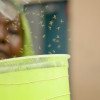Would the fungus-based anti-flea drug also kill mosquitoes?
Question
In your recent show, you discussed research into a synthesized neurotoxin based on compounds released by a fungus used to combat fleas and ticks on pets. One of the characteristics of the toxin mentioned was that it affected all insects, but had absolutely no effect on pets or humans. In this case, wouldn't it be an ideal way to help bring down mosquito and other human pest populations as well?
Answer
Chris - Indeed, this was the nodulisporium fungus which is an environmental fungus but it produces nodulisporic acid which the paper we reported on last week is scientists making a version of that called nodulisporamide which targets an ion channel which is only present in insects. It's not present in people and it's therefore neurotoxic to insects but because we don't have their ion channel, it's harmless to us. I suppose it's possible that we could do the same thing for other flying insects. The problem is of course, you'd have to dose enormous numbers of people. If you're going to dose enormous numbers of people or something, you might as well give them an anti-malaria drug in the first place. So, I guess that that's one of the criticisms. Isn't it? That if you're going to do something like that, well, might as well treat the disease that's mostly the problem, but it's a good idea and it may be that that's one way to tackle this.Ben - That's very true. If we already had the facility to dose that many people with any medication then, yes, we'd be using anti-malarials, wouldn't we?










Comments
Add a comment